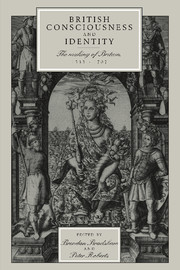Book contents
- Frontmatter
- Contents
- Notes on the contributors
- Preface
- Introduction
- 1 Tudor Wales, national identity and the British inheritance
- 2 The English Reformation and identity formation in Ireland and Wales
- 3 Faith, culture and sovereignty: Irish nationality and its development, 1558–1625
- 4 From English to British literature: John Lyly's Euphues and Edmund Spenser's The Faerie Queen
- 5 The British problem in three tracts on Ireland by Spenser, Bacon and Milton
- 6 James Ussher and the creation of an Irish protestant identity
- 7 Seventeenth-century Wales: definition and identity
- 8 Scottish identity in the seventeenth century
- 9 The Gaidhealtachd and the emergence of the Scottish Highlands
- 10 ‘No remedy more proper’: Anglo-Irish unionism before 1707
- 11 Protestantism, constitutionalism and British identity under the later Stuarts
- Index
10 - ‘No remedy more proper’: Anglo-Irish unionism before 1707
Published online by Cambridge University Press: 15 March 2010
- Frontmatter
- Contents
- Notes on the contributors
- Preface
- Introduction
- 1 Tudor Wales, national identity and the British inheritance
- 2 The English Reformation and identity formation in Ireland and Wales
- 3 Faith, culture and sovereignty: Irish nationality and its development, 1558–1625
- 4 From English to British literature: John Lyly's Euphues and Edmund Spenser's The Faerie Queen
- 5 The British problem in three tracts on Ireland by Spenser, Bacon and Milton
- 6 James Ussher and the creation of an Irish protestant identity
- 7 Seventeenth-century Wales: definition and identity
- 8 Scottish identity in the seventeenth century
- 9 The Gaidhealtachd and the emergence of the Scottish Highlands
- 10 ‘No remedy more proper’: Anglo-Irish unionism before 1707
- 11 Protestantism, constitutionalism and British identity under the later Stuarts
- Index
Summary
Can the divergent political and cultural experience of eighteenth century Scotland and Ireland be traced to the 1707 act of Union? The great Victorian historians James Froude and William Lecky thought so. In their view Scotland's prosperity and stability, and Ireland's poverty and discontent, were rooted in the former's admission to, and the latter's exclusion from, full partnership with England in the new British empire. While that interpretation is, to say the least, debatable, the insight on which it is predicated is suggestive; namely that the Anglo-Scottish union constitutes an event in Irish history. Certainly it had an impact at the time. Irish readers could follow the Anglo-Scottish stand-off in 1704–5 in the pages of the Dublin-published Impartial Occurrences, just as they were later furnished with detailed reports of the negotiations leading to the union, ‘this great and glorious work’, by the Dublin Gazette. And during these tense years the authorities kept a close watch on northern presbyterians, fearful that they were conspiring with their Scottish brethren to oppose the treaty. In 1759 the mere rumour of an intended union between Britain and Ireland sparked off rioting in Dublin, but in 1707, outside Ulster, public (that is Anglican) opinion ran in precisely the opposite direction. It seems that Jonathan Swift's protests at Ireland's exclusion from the Union, his ‘Verses said to be composed upon the union’ and the better known The Story of the Injured Lady – though published posthumously – reflected public concerns.
Swift scholars usually relate the Injured Lady back to William Molyneux's The Case of Ireland Being Bound by Acts of Parliament in England, Stated (1698) and forward to his own Drapier's Letters in the 1720s.
- Type
- Chapter
- Information
- British Consciousness and IdentityThe Making of Britain, 1533–1707, pp. 301 - 320Publisher: Cambridge University PressPrint publication year: 1998
- 2
- Cited by



